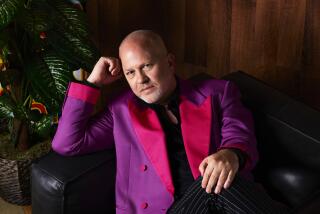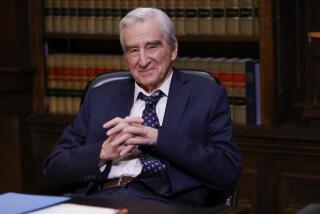Show Affected Europe’s Legal Systems : Burr Reflects on ‘Perry Mason’ and Its Impact Overseas
- Share via
NEW YORK — Raymond Burr, leaning on a cane, made his way across the loading dock in the basement of NBC.
Throughout the recently ended strike against the network, NBC brought stars to the studio this way to avoid picket lines.
The loading dock was crowded with blue-collar workers, many of them black, Latino and Asian. “Look, Perry Mason!” they said, nudging each other. “Hi, Mr. Mason!”
They all waved at each other--the workers and the actor--as if they were old friends. Then, waiting for the freight elevator, he turned to a reporter and said, “Remember what I was saying earlier, about the minorities? There’s your proof.”
Earlier, in an interview at his hotel, Burr was explaining why “Perry Mason” is still so popular three decades after it premiered on Sept. 21, 1957. The show, featuring the brilliant defense attorney created by author Erle Stanley Gardner, ran on CBS until 1966.
Since 1986, NBC has found the subsequent “Perry Mason” made-for-TV movies so popular that it runs them during “sweeps,” the four months a year when ratings determine advertising rates. In this November’s sweeps, there is “Perry Mason: The Case of the Scandalous Scoundrel,” airing Sunday.
“First of all, we try to do as good a show as we possibly can as far as entertainment is concerned, that’s the first responsibility,” Burr said. “Then, we enjoy something that our audiences didn’t know much about until the Perry Mason stories came along and that is our system of justice. . . . When I started as Perry Mason, most of the minorities in this country didn’t know what they had. . . . They didn’t realize our court system covered everybody.”
It was not just Perry Mason and Burr’s other popular character, Ironside, who became popular, but the system of justice they represented, Burr said.
“Around the world, ‘Perry Mason’ and ‘Ironside’ both have been the two most popular American dramatic hours, especially in the countries with the Napoleonic Code, guilty until proven (innocent)--Spain, France and Italy, Portugal and one or two other countries.
“When ‘Perry Mason’ went on the air in Italy, one of the (Italian) senators said, ‘You--’Perry Mason’ and shows like you--are going to cause changes in the Italian law.’ And they have. We had dinner again last year, he’s a very old man, but he said, ‘You see?’ They’ve made many changes in the Italian law based on the resentment of guilty until proven innocent.”
On the brief ride up 5th Avenue, even jaded New Yorkers gawked at the familiar figure in the limousine. They couldn’t hear Burr complaining that the show that made him so famous also ruined his private life.
“It prevented me from any kind of life at all,” he said. “It is something that I took, it consumed me for nine years, and I could’ve stopped it, but you’re made to feel guilty immediately by the network, by the people who are working, by all of that, the crew, the cast and the public. And you do owe a responsibility to all of those people.”
He had planned “Ironside” as a movie but it, too, became a series, running for eight years on NBC, until 1975. Burr played a San Francisco police chief paralyzed by a bullet but still fighting crime from his wheelchair.
Nowadays, except for the “Perry Mason” movies, Burr mostly limits himself to producing films. He said he turned down a role in a proposed sequel to “Rear Window,” the 1954 Alfred Hitchcock classic in which Burr was the suspicious-acting neighbor spied on by James Stewart and Grace Kelly.
But he mused in true Perry Mason style, “There is a way to do it which is kind of interesting. . . . My character was never proven to be guilty.”
More to Read
The complete guide to home viewing
Get Screen Gab for everything about the TV shows and streaming movies everyone’s talking about.
You may occasionally receive promotional content from the Los Angeles Times.






